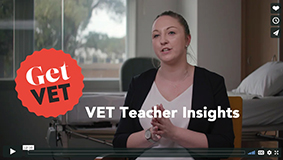For Parents
What is VET?
The formal title for VET in schools is VDSS – Vocational Education and Training Delivered to Secondary Students.
An easy way to remember what VET is all about is to think of it as a subject that a student chooses to study. We call these subjects courses because when a student has completed the course they will receive a nationally recognised or state recognised certificate that can be used for future employment, university or industry recognition.
Instead of studying the course in small time-slots spread throughout the week like students do at school, students spend a whole day at the course. In the Wimmera Mallee Region, we deliver these VET courses in Horsham every Wednesday. Some schools may choose to deliver a VET subject on their campus, but a wider selection of courses is available in Horsham at a number of Registered Training Organisations (RTOs). These courses are available for students in years 10 – 12. If a student wishes to study a VET course, they need to discuss this with the school VET Coordinator. The VET Coordinator, in conjunction with the principal, will help the student decide if this the best pathway for the student to follow and which course is best suited to the student’s future plans.
What are the benefits of doing VET?
There are many reasons why a student may choose to study a VET course, but the most common reason is that the student wants to learn practical skills in a specific industry.
VET courses deliver skills in a specific industry that are strongly desired by employers. Because businesses and industry work together hand-in-hand with VET providers to tailor-make the courses, the skills that are being taught in VET courses are up-to-date and will be strongly desired by employers when it comes time for a student to begin their career.
VET is practical
VET qualifications combine the theory-based learning with the practical component. While all learning requires a degree of theory, the VET courses are designed to combine the theory component with the practical component so students are able to link the two together and gain a deep understanding of the unit of work. Depending on the course studied, a student can expect to learn and develop skills that they will take with them when they leave. These skills will be both hard skills like using hand tools or electrical tools and soft skills like teamwork, communication, problem solving and creativity.
Nationally Recognised Training
VET courses delivered in the Wimmera Southern Mallee VET Cluster are either state or nationally recognised. Courses we deliver are mostly at a certificate II or III level. We do offer bespoke courses as well that deliver a range of qualifications that a student may find useful upon leaving school. Some of the units delivered in most courses include First Aid, Occupational Health and Safety, Communication and Working Safely in the Industry.
Scored Assessments
Some VET courses offer a ‘scored assessment’. This can be used as one of the subjects a student studies as part of their VCE and can be added to the student’s ATAR for a university placement. If a student is studying VCE and wants to complete a VET course, the student should discuss this with their school VET Coordinator or Careers Advisor.
Future Prospects
If students successfully complete their VET course, they come out of school with skills-based knowledge and a Certificate of qualification. The skills learnt in a VET course can assist a student to go directly from school into employment, whether that be an apprenticeship, a traineeship or another position. It also gives students who wish to go on to study a Certificate IV or diploma a head start into their training. Either way, VET offers students a leg up in pursuing a future pathway.
Something to Consider
VET is funded by the Department of Education and Training so if a student at a public school selects a course while they are still at school, the school will pay the bulk of the fees associated with the course. Students may be required to pay a materials fee, but this fee is a small fraction of the cost of the course (usually less than 10%). So, not only do students gain a nationally or state-recognised qualification at the successful completion of the course, they gain a certificate for a very small cost. Should the student then go on to an apprenticeship or traineeship, they will be earning while they learn. This makes the student a winner all round.
Students from the private sector will also benefit from studying VET while still at school. The fee charged by the school will vary from school to school, but students will still gain the advantage of gaining a national or state recognised qualification for a fraction of the cost.


